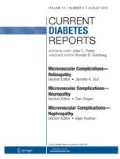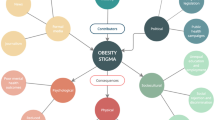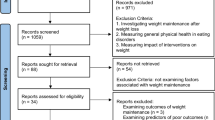Abstract
Purpose of Review
This study aims to examine the operationalisation of ‘psychological insulin resistance’ (PIR) among people with type 2 diabetes and to identify and critique relevant measures.
Recent Findings
PIR has been operationalised as (1) the assessment of attitudes or beliefs about insulin therapy and (2) hypothetical or actual resistance, or unwillingness, to use to insulin. Five validated PIR questionnaires were identified. None was fully comprehensive of all aspects of PIR, and the rigour and reporting of questionnaire development and psychometric validation varied considerably between measures.
Summary
Assessment of PIR should focus on the identification of negative and positive attitudes towards insulin use. Actual or hypothetical insulin refusal may be better conceptualised as a potential consequence of PIR, as its assessment overlooks the attitudes that may prevent insulin use. This paper provides guidance on the selection of questionnaires for clinical or research purpose and the development of new, or improvement of existing, questionnaires.
Similar content being viewed by others
References
Papers of particular interest, published recently, have been highlighted as: • Of importance ••Of major importance
Inzucchi SE, Bergenstal RM, Buse JB, Diamant M, Ferrannini E, Nauck M, et al. Management of hyperglycemia in type 2 diabetes, 2015: a patient-centered approach: update to a position statement of the American Diabetes Association and the European Association for the Study of Diabetes. Diabetes Care. 2015;38(1):140–9.
Nathan DM, Buse JB, Davidson MB, Ferrannini E, Holman RR, Sherwin R, et al. Medical management of hyperglycemia in type 2 diabetes: a consensus algorithm for the initiation and adjustment of therapy a consensus statement of the American Diabetes Association and the European Association for the Study of Diabetes. Diabetes Care. 2009;32(1):193–203.
• Khunti S, Davies MJ, Khunti K. Clinical inertia in the management of type 2 diabetes mellitus: a focused literature review. British Journal of Diabetes & Vascular Disease. 2015;15(2):65–9. Recent literature review providing useful overview of the problem of clinical inertia in type 2 diabetes.
Harris SB, Kapor J, Lank CN, Willan AR, Houston T. Clinical inertia in patients with T2DM requiring insulin in family practice. Can Fam Physician. 2010;56(12):e418–e24.
Blak BT, Smith HT, Hards M, Maguire A, Gimeno V. A retrospective database study of insulin initiation in patients with type 2 diabetes in UK primary care. Diabet Med. 2012;29(8):e191–e8. doi:10.1111/j.1464-5491.2012.03694.x.
• Khunti K, Nikolajsen A, Thorsted BL, Andersen M, Davies MJ, Paul SK. Clinical inertia with regard to intensifying therapy in people with type 2 diabetes treated with basal insulin. Diabetes Obesity Metab. 2016;18(4):401–9. doi:10.1111/dom.1 26. Large-scale retrospecitve study highlighting the clinical delay of insulin intensification among people with insulin-treated type 2 diabetes.
Khunti K, Wolden ML, Thorsted BL, Andersen M, Davies MJ. Clinical inertia in people with type 2 diabetes: a retrospective cohort study of more than 80,000 people. Diabetes Care. 2013;36(11):3411. doi:10.2337/dc13-0331.
Khunti K, Damci T, Meneghini L, Pan CY, Yale JF. Study of once daily Levemir (SOLVE™): insights into the timing of insulin initiation in people with poorly controlled type 2 diabetes in routine clinical practice. Diabetes Obes Metab. 2012;14(7):654–61.
Fulcher G, Roberts A, Sinha A, Proietto J. What happens when patients require intensification from basal insulin? A retrospective audit of clinical practice for the treatment of type 2 diabetes from four Australian centres. Diabetes Res Clin Pract. 2015;108(3):405–13.
Grant RW, Buse JB, Meigs JB. Quality of diabetes care in U.S. academic medical centers: low rates of medical regimen change. Diabetes Care. 2005;28(2):337–442.
Nam S, Chesla C, Stotts NA, Kroon L, Janson SL. Barriers to diabetes management: patient and provider factors. Diabetes Res Clin Pract. 2011;93(1):1–9.
Furler J, Spitzer O, Young D, Best J. Insulin in general practice: barriers and enablers for timely initiation. Aust Fam Physician. 2011;40(8):617–21.
Shaefer CF Jr. Clinical inertia: overcoming a major barrier to diabetes management. Insulin. 2006;1(2):61–4.
Gherman A, Veresiu I, Sassu R, Schnur J, Scheckner B, Montgomery G. Psychological insulin resistance: a critical review of the literature. Practical Diabetes International. 2011;28(3):125–8d.
Brod M, Kongsø JH, Lessard S, Christensen TL. Psychological insulin resistance: patient beliefs and implications for diabetes management. Qual Life Res. 2009;18(1):23–32. doi:10.1007/s11136-008-9419-1.
•• Ng CJ, Lai PSM, Lee YK, Azmi SA, Teo CH. Barriers and facilitators to starting insulin in patients with type 2 diabetes: a systematic review. Int J Clin Pract. 2015;69(10):1050–70. doi:10.1111/ijcp.12691. Recent mixed-methods systematic review of barriers and facilitators of insulin initiation among people with type 2 diabetes.
Wang HF, Yeh MC. Psychological resistance to insulin therapy in adults with type 2 diabetes: mixed-method systematic review. J Adv Nurs. 2012;68(4):743–57.
Leslie CA, Satin-Rapaport W, Matheson D, Stone R, Enfield G. Psychological insulin resistance: a missed diagnosis. Diabetes Spectrum. 1994;7(1):52–7.
Jenkins N, Hallowell N, Farmer AJ, Holman RR, Lawton J. Initiating insulin as part of the treating to target in type 2 diabetes (4-T) trial: an interview study of patients’ and health professionals’ experiences. Diabetes Care. 2010;33(10):2178–80.
Peyrot M, Rubin RR, Kruger DF, Travis LB. Correlates of insulin injection omission. Diabetes Care. 2010;33(2):240–5.
Davies MJ, Gagliardino JJ, Gray LJ, Khunti K, Mohan V, Hughes R. Real-world factors affecting adherence to insulin therapy in patients with type 1 or type 2 diabetes mellitus: a systematic review. Diabet Med. 2013;30(5):512–24. doi:10.1111/dme.12128.
Peyrot M, Barnett AH, Meneghini LF, Schumm-Draeger PM. Insulin adherence behaviours and barriers in the multinational global attitudes of patients and physicians in insulin therapy study. Diabet Med. 2012;29(5):682–9.
• Holmes-Truscott E, Browne JL, Speight J. The impact of insulin therapy and attitudes towards insulin intensification among adults with type 2 diabetes: a qualitative study. J Diabetes Complicat. 2016;30(6):1151–7. doi:10.1016/j.jdiacomp.2016.03.027. One of the first real-world qualitative studies examining attitudes to insulin intensification among people with type 2 diabetes.
•• McBain H, Begum S, Rahman S, Mulligan K. Barriers to and enablers of insulin self-titration in adults with type 2 diabetes: a qualitative study. Diabet Med. 2016; doi:10.1111/dme.13196. First in-depth qualitative exploration of perceived barriers to and enablers of self-titration among people with type 2 diabetes.
UKPDS. Relative efficacy of randomly allocated diet, sulphonylurea, insulin, or metformin in patients with newly diagnosed non-insulin dependent diabetes followed for three years (UKPDS 13). BMJ. 1995;310(6972):83–8.
• Odawara M, Ishii H, Tajima N, Iwamoto Y. Impact of patient attitudes and beliefs to insulin therapy upon initiation, and their attitudinal changes after initiation: the DAWN JAPAN study. Curr Med Res Opin. 2016;32(4):681–6. This articles describes, for the first time, the prospective association between attitudes towards insulin and actual insulin uptake in type 2 diabetes.
Khan H, Lasker SS, Chowdhury TA. Prevalence and reasons for insulin refusal in Bangladeshi patients with poorly controlled type 2 diabetes in East London. Diabet Med. 2008;25(9):1108–11.
Polonsky WH, Fisher L, Dowe S, Edelman SV. Why do patients resist insulin therapy? [Abstract]. Diabetes. 2003;52(SUPPLEMENT(1)):A417.
Polonsky WH, Fisher L, Guzman S, Villa-Caballero L, Edelman SV. Psychological insulin resistance in patients with type 2 diabetes: the scope of the problem. Diabetes Care. 2005;28(10):2543–5.
Polonsky WH, TRS H, Dain MP, Snoek FJ. Are patients with type 2 diabetes reluctant to start insulin therapy? An examination of the scope and underpinnings of psychological insulin resistance in a large, international population. Curr Med Res Opin. 2011;27(6):1169–74.
Holmes-Truscott E, Blackberry I, O’Neal DN, Furler J, Speight J. Willingness to initiate insulin among adults with type 2 diabetes in Australian primary care: results from the Stepping Up Study. Diabetes Res Clin Pract. 2016;114:126–35.
Gherman A, Alionescu A. Depression and Dysfunctional beliefs. Predictors of negative appraisal of insulin treatment. Journal of Evidence-Based Psychotherapies. 2015;15(2):207.
Larkin ME, Capasso VA, Chen CL, Mahoney EK, Hazard B, Cagliero E, et al. Measuring psychological insulin resistance: barriers to insulin use. Diabetes Educ. 2008;34(3):511–7.
Wong S, Lee J, Ko Y, Chong MF, Lam CK, Tang WE. Perceptions of insulin therapy amongst Asian patients with diabetes in Singapore. Diabet Med. 2011;28(2):206–11.
Nur Azmiah Z, Zulkarnain AK, Tahir A. Psychological insulin resistance (PIR) among type 2 diabetes patients at public health clinics in federal territory of Malaysia. Int Med J Malaysia. 2011;10(2):7–12.
Lee KP. Psychological factors associated with psychosocial insulin resistance in primary care patients in Hong Kong. Journal of Clinical and Translational Endocrinology. 2015;2(4):157–62.
Woudenberg YJC, Lucas C, Latour C, Scholte op Reimer WJM. Acceptance of insulin therapy: a long shot? Psychological insulin resistance in primary care. Diabet Med. 2012;29(6):796–802. doi:10.1111/j.1464-5491.2011.03552.x.
Martinez L, Consoli SM, Monnier L, Simon D, Wong O, Yomtov B et al. Studying the Hurdles of Insulin Prescription (SHIP©): development, scoring and initial validation of a new self-administered questionnaire. Health Qual Life Outcomes. 2007;5(53). doi: 10.1186/1477-7525-5-53.
•• Holmes-Truscott E, Furler J, Blackberry I, O’Neal D, Speight J. Predictors of insulin uptake among adults with type 2 diabetes in the Stepping Up Study. Diabetes Res Clin Pract. 2017; doi:10.1016/j.diabres.2017.01.002. Assesses the predictive validity of both the Insulin Treatment Appraisal Scale and hypothetical willingness responses in terms of actual insulin uptake.
•• Patel N, Stone MA, McDonough C, Davies MJ, Khunti K, Eborall H. Concerns and perceptions about necessity in relation to insulin therapy in an ethnically diverse UK population with type 2 diabetes: a qualitative study focusing mainly on people of South Asian origin. Diabet Med. 2014;32(5):635–44. doi:10.1111/dme.12648. Purposes the utility of the necessity-concerns framework in understanding the acceptance of insulin iniation among people with type 2 diabetes.
Jenkins N, Hallowell N, Farmer AJ, Holman RR, Lawton J. Participants’ experiences of intensifying insulin therapy during the treating to target in type 2 diabetes (4-T) trial: qualitative interview study. Diabet Med. 2011;28(5):543–8.
Ho EY, James J. Cultural barriers to initiating insulin therapy in Chinese people with type 2 diabetes living in Canada. Can J Diabetes. 2006;30(4):390–6.
Hunt LM, Arar NH, Akana LL. Herbs, prayer, and insulin: use of medical and alternative treatments by a group of Mexican American diabetes patients. J Fam Pract. 2000;49(3):216–23.
Noakes H. Perceptions of black African and African-Caribbean people regarding insulin. J Diabetes Nurs. 2010;14(4):148–56.
Patel N, Stone MA, Chauhan A, Davies MJ, Khunti K. Insulin initiation and management in people with type 2 diabetes in an ethnically diverse population: the healthcare provider perspective. Diabet Med. 2012;29(10):1311–6. doi:10.1111/j.1464-5491.2012.03669.x.
Petrak F, Stridde E, Leverkus F, Crispin AA, Forst T, Pfützner A. Development and validation of a new measure to evaluate psychological resistance to insulin treatment. Diabetes Care. 2007;30(9):2199–204.
Snoek FJ, Skovlund SE, Pouwer F. Development and validation of the insulin treatment appraisal scale (ITAS) in patients with type 2 diabetes. Health Qual Life Outcomes. 2007;5:69. doi:10.1186/1477-7525-5-69.
Fu SN, Chin WY, Wong CKH, Yeung VTF, Yiu MP, Tsui HY, et al. Development and validation of the Chinese Attitudes to Starting Insulin Questionnaire (Ch-ASIQ) for primary care patients with type 2 diabetes. PLoS One. 2013;8(11):e78933.
Song Y, Jeon Y, Cho J, Kim B. Development of a psychological insulin resistance scale for Korean patients with diabetes. J Korean Acad Nurs. 2016;46(6):813–23.
•• Gherman A. Measuring psychological insulin resistance from the rational emotive and behavioral therapy perspective: development of the beliefs about insulin scale. Journal of Evidence-Based Psychotherapies. 2016;16(2):177. This articles describes the development and validation of the Romanian Beliefs about Insulin Scale.
Lee K. Validity and reliability of the Chinese version of the insulin treatment appraisal scale among primary care patients in Hong Kong. Hong Kong Med J. 2016;22(4):306–13.
Chang M, Huang C, Li T, Liao L, Chen C. Validation of the Chinese-version of the insulin treatment appraisal scale. Journal of Diabetes Investigation. 2010;1(suppl 1):88.
Huis In T, EMJ V, Makine C, Nouwen A, Karşda C, Kadioǧlu P, Karşda K, et al. Validation of the Turkish version of the problem areas in diabetes scale. Cardiovascular Psychiatry and Neurology. 2011; doi:10.1155/2011/315068.
Holmes-Truscott E, Pouwer F, Speight J. Further investigation of the psychometric properties of the insulin treatment appraisal scale among insulin-using and non-insulin-using adults with type 2 diabetes: results from diabetes MILES-Australia. Health Qual Life Outcomes. 2014;12:87. doi:10.1186/1477-7525-12-87.
Fu SN, Wong CKH, Chin WY, Luk W. Association of more negative attitude towards commencing insulin with lower glycosylated hemoglobin (HbA1c) level: a survey on insulin-naïve type 2 diabetes mellitus Chinese patients. J Diabetes Metab Disord. 2016;15(1):3.
Bahrmann A, Abel A, Zeyfang A, Petrak F, Kubiak T, Hummel J, et al. Psychological insulin resistance in geriatric patients with diabetes mellitus. Patient Educ Couns. 2014;94(3):417–22. doi:10.1016/j.pec.2013.11.010.
Chen CC, Chang MP, Hsieh MH, Huang CY, Liao LN, Li TC. Evaluation of perception of insulin therapy among Chinese patients with type 2 diabetes mellitus. Diabetes and Metab. 2011;37(5):389–94.
Hermanns N, Mahr M, Kulzer B, Skovlund SE, Haak T. Barriers towards insulin therapy in type 2 diabetic patients: results of an observational longitudinal study. Health Qual Life Outcomes. 2010;8:113. doi:10.1186/1477-7525-8-113.
Petrak F, Herpertz S, Stridde E, Pfützner A. Psychological insulin resistance in type 2 diabetes patients regarding oral antidiabetes treatment, subcutaneous insulin injections, or inhaled insulin. Diabetes Technol Ther. 2013;15(8):702–10.
Keij SM, Ismail K, Winkley K. The association between psychological distress and starting insulin therapy in people with type 2 diabetes: a prospective cohort study. Diabetic UK Professional Conference Gasglow: Diabetic Medicine; 2016. p. 170–5.
• Hermanns N, Lilly LC, Mader JK, Aberer F, Ribitsch A, Kojzar H, et al. Novel simple insulin delivery device reduces barriers to insulin therapy in type 2 diabetes results from a pilot study. J Diabetes Sci Technol. 2015;9(3):581–7. The first study to examine change in PIR questionnaire scores following insulin administration device change among people with type 2 diabetes.
Liebl A, Andersen H, Svendsen AL, Vora J, Yale JF. The SSG. Resource utilisation and quality of life following initiation of insulin detemir in patients with type 2 diabetes mellitus. Int J Clin Pract. 2013;67(8):740–9. doi:10.1111/ijcp.12133.
Peyrot M, Rubin RR, Lauritzen T, Skovlund SE, Snoek FJ, Matthews DR, et al. Resistance to insulin therapy among patients and providers: results of the cross-national Diabetes Attitudes, Wishes, and Needs (DAWN) study. Diabetes Care. 2005;28(11):2673–9.
Snoek FJ, Mollema ED, Heine RJ, Bouter LM, Van Der Ploeg HM. Development and validation of the diabetes fear of injecting and self- testing questionnaire (D-FISQ): first findings. Diabet Med. 1997;14(10):871–6.
Anderson RT, Skovlund SE, Marrero D, Levine DW, Meadows K, Brod M, et al. Development and validation of the insulin treatment satisfaction questionnaire. Clin Ther. 2004;26(4):565–78.
Nam S, Chesla C, Stotts NA, Kroon L, Janson SL. Factors associated with psychological insulin resistance in individuals with type 2 diabetes. Diabetes Care. 2010;33(8):1747–9.
Morris JE, Povey RC, Street CG. Experiences of people with type 2 diabetes who have changed from oral medication to self-administered insulin injections. A qualitative study. Practical Diabetes International. 2005;22(7):239–43.
Phillips A. Experiences of patients with type 2 diabetes starting insulin therapy. Nurs Stand. 2007;21(23):35.
Polinski JM, Smith BF, Curtis BH, Seeger JD, Choudhry NK, Connolly JG, et al. Barriers to insulin progression among patients with type 2 diabetes: a systematic review. Diabetes Educ. 2012;39(1):53–65. doi:10.1177/0145721712467696.
Brod M, Alolga SL, Meneghini L. Barriers to initiating insulin in type 2 diabetes patients: development of a new patient education tool to address myths. Misconceptions and Clinical Realities Patient. 2014;7(4):437–50.
Patel N, Stone MA, Hadjiconstantinou M, Hiles S, Troughton J, Martin-Stacey L, et al. Using an interactive DVD about type 2 diabetes and insulin therapy in a UK South Asian community and in patient education and healthcare provider training. Patient Educ Couns. 2015;98(9):1123–30. doi:10.1016/j.pec.2015.04.018.
Lee YK, Lee PY, Ng CJ. A qualitative study on healthcare professionals’ perceived barriers to insulin initiation in a multi-ethnic population. BMC Fam Pract. 2012;13:28. doi:10.1186/1471-2296-13-28.
Phillips A. Starting patients on insulin therapy: diabetes nurse specialist views. Nurs Stand. 2007;21(30):35–40.
• Hendrieckx C, Halliday JA, Beeney LJ, Speight J. Diabetes and emotional health: a handbook for health professionals supporting adults with type 1 or type 2 diabetes. Canberra: National Diabetes Services Scheme; 2016. Available from: www.ndss.org.au. An evidence-based, clinically infromed, practical resource to support health professionals to meet the emotional and mental health needs of adults with diabetes. Chapter 5 is focused on the psychological barriers to insulin use.
Acknowledgments
EHT and JS are supported by the funding provided to The Australian Centre for Behavioural Research in Diabetes by Diabetes Victoria and Deakin University. FP is supported by the University of Southern Denmark.
Author information
Authors and Affiliations
Corresponding author
Ethics declarations
Conflict of Interest
All authors declare no external support for any aspect of the submitted work.
EHT has undertaken research funded by an unrestricted educational grant from Abbott Diabetes Care to The Australian Centre for Behavioural Research in Diabetes (ACBRD) and has served on an AstraZeneca advisory board.
FP has received travel grants and funding from Novo Nordisk to his research group. FP co-developed the Insulin Treatment Appraisal Scale (ITAS).
JS has served as an advisory board member for Roche Diabetes Care, Sanofi ANZ and Janssen Pharmaceuticals. Her research group (ACBRD) has received unrestricted educational grants from Abbott Diabetes Care and Sanofi ANZ and consultancy income from Roche Diabetes Care, AstraZeneca and Sanofi ANZ.
Human and Animal Rights and Informed Consent
This article does not contain any studies with human or animal subjects performed by any of the authors.
Additional information
This article is part of the Topical Collection on Psychosocial Aspects
Electronic Supplementary Material
ESM 1
(DOCX 25 kb)
Rights and permissions
About this article
Cite this article
Holmes-Truscott, E., Pouwer, F. & Speight, J. Assessing Psychological Insulin Resistance in Type 2 Diabetes: a Critical Comparison of Measures. Curr Diab Rep 17, 46 (2017). https://doi.org/10.1007/s11892-017-0873-4
Published:
DOI: https://doi.org/10.1007/s11892-017-0873-4




